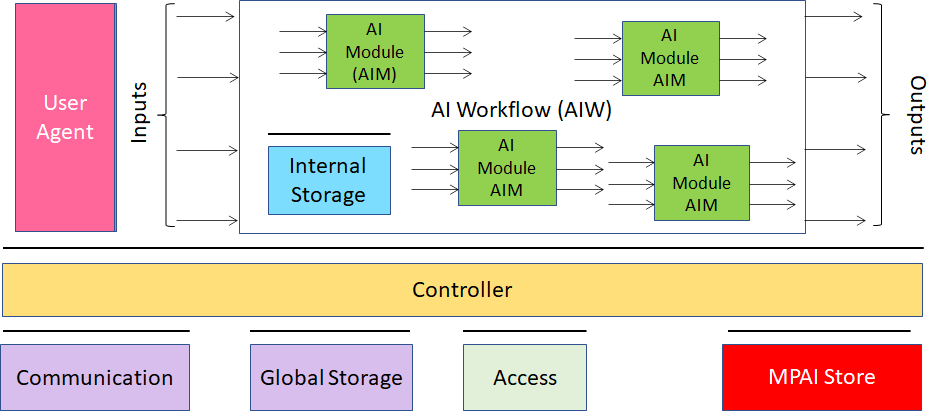Moving Picture, Audio and Data Coding by Artificial Intelligence (MPAI) is an international, non-profit, unaffiliated Standards Developing Organisation with the mission to develop Artificial Intelligence (AI) data coding standards, with clear Intellectual Property Rights (IPR) licensing frameworks. Compression and feature-based description are notable examples of coding.
Research has shown that data coding with AI-based technologies is generally more efficient than possible with existing technologies.
MPAI standards are developed using a rigorous process that combines openness to all interested parties when a new standard is identified, confidentiality when technologies are integrated and openness to community review.
 Figure 1 – The stages of the MPAI standards development process
Figure 1 – The stages of the MPAI standards development process
The AI-based Company Performance Prediction of MPAI-CUI, predicts the performance of a company, from its governance, financial and risks data in a given time horizon of prediction.
The performance of a company is measured by:
- Default Probability (i.e., the default probability in a specified number of future months based on company financial features).
- Organisational Model Index (i.e., the adequacy of the organisational model).
- Business Discontinuity Index (i.e., the probability of an interruption of the operations of the company for a period of time less than 2% of the prediction horizon).
For further details the interested reader should read the MPAI-CUI Standard.
An online MPAI-CUI demo is available online.
The novelty of MPAI-CUI is in its ability to analyse, through AI, the large amount of data required by regulation and extract the most relevant information elements. Moreover, compared to state-of-the-art techniques that predict the performance of a company, MPAI-CUI allows extending the time horizon of prediction.
Companies, financial institutions can use MPAI-CUI in a variety of contexts:
- To support the company’s board in deploying efficient strategies. A company can analyse its financial performance, identifying possible clues to the crisis or risk of bankruptcy years in advance. It may help the board of directors and decision-makers to make the proper decisions to avoid these situations, conduct what-if analysis, and devise efficient strategies.
- To assess the financial health of companies applying for funds/financial help. A financial institution receiving a request for financial help from a troubled company, can access the company’s financial and organisational data and make an AI-based assessment, as well as a prediction of future performance of the company. This helps the financial institution to make the right decision whether funding that company or not, based on a broad vision of its situation.
MPAI-CUI is reliable because it has been developed by industry experts who have assiduously participated in the development of the MPAI-CUI Technical Specification. The Reference Software, another specification of the MPAI-CUI Standards suite, is a conforming implementation of the Standard released with the MPAI software licence (modified BSD).
MPAI-CUI, like other MPAI Application Standards, is implemented in the AI Framework (AIF), specified by the MPAI-AIF standard whose Reference Model is depicted in Figure 2. An AIF can execute an AI Workflows (AIW), composed of basic processing elements called AI Modules (AIM).
 Figure 2 – The AI Framework (AIF) Reference Model and its Components
Figure 2 – The AI Framework (AIF) Reference Model and its Components
Implementers can upload their implementations to the MPAI Store where they are tested for security and for implementation correctness using Conformance Testing, another specification of the MPAI-CUI standard suite.
The possibility to test an implementation for conformance has unique benefits to the industry because the testing performed by the MPAI Store ensures that implementations made available to users via the Store are interoperable with other implementations and that a new and smarter AIM with the same functionality can be used to replace an old and less efficient AIM. MPAI standards implementations are enabled by AI state of the art. However, because of the intrinsic competition between AIM developers, MPAI standards also feed innovation. By adding new AIMs, MPAI standard gradually make possible more sophisticated and function-richer implementations.
MPAI-CUI brings benefits to society, too. Users are guided into selecting state-of-the-art and reliable applications using the results of Performance Assessors who competitively rate AIMs from different implementers using Performance Assessment, the fourth specification of the MPAI-CUI suite.
Note: Currently, the MPAI Store is not operational. However, it is possible to use the MPAI-CUI standard even without the support of the Store.

